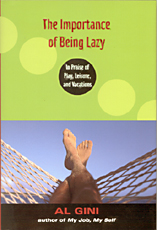Al Gini, a philosopher and radio commentator, notes that when responding to the question "How are you?" people usually respond with some form of "I am so busy!" This signals a distressing trend — we are so harried and hurried that we have no time for the things that truly matter and must be done slowly, such as sex, conversation, taking a leisurely stroll in nature, listening to what someone else is saying, relaxing at a concert, or just doing nothing. The world of multitasking and hyperactivity exhausts us and leaves us feeling listless. Or, as Gini asks, "When life becomes an Olympic endurance event ("the Everydayathon"), when the stopwatch is always ticking, when are we supposed to have fun? When will there be a time to be human?" Living by a day planner, Palm Pilot, or Roladex is not all there is.
Our lives are enriched by true leisure that feeds the soul. But contemporary Americans are missing the boat. They work 350 hours more per year than Europeans and 70 hours more than the Japanese. One in four Americans does not take a vacation at all. Joe Robinson, former editor of a travel magazine, has stated, "We're the most vacation-starved country in the industrial world." And let's not forget that many people stay connected with the office and the daily financial news even while they are on vacation! Instead of a long vacation, many have opted for weekends away at a second home. But with this arrangement so much time is spent on commuting and maintenance of the property that it can seem like work. Shopping has become for many Americans a psychological substitute for leisure. For a while, it was even touted as a genuine form of patriotism!
Gini takes his hat off to the English writer G. K. Chesterton who saluted what he called "the noble habit of doing nothing." He quotes Diane Ackerman and Donald Hall in support of play that can both revitalize and rejuvenate us. Both Judaism and Christianity have set forth a weekly Sabbath as an oasis in time when people can truly play and do nothing of practical import. Once again, religion offers an antidote to the cultural warp that is so explicitly spelled out in The Importance of Being Lazy.
